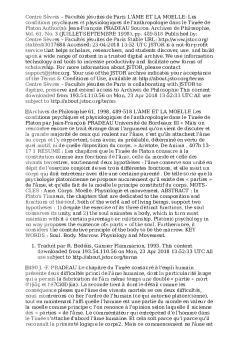La moelle et l x27 ame timee
Centre Sèvres ?? Facultés jésuites de Paris L'? ME ET LA MOELLE Les conditions psychiques et physiologiques de l'anthropologie dans le Timée de Platon Author s Jean-François PRADEAU Source Archives de Philosophie Vol No JUILLET-SEPTEMBRE pp - Published by Centre Sèvres ?? Facultés jésuites de Paris Stable URL http www jstor org stable Accessed - - UTC JSTOR is a not-for-pro ?t service that helps scholars researchers and students discover use and build upon a wide range of content in a trusted digital archive We use information technology and tools to increase productivity and facilitate new forms of scholarship For more information about JSTOR please contact support jstor org Your use of the JSTOR archive indicates your acceptance of the Terms Conditions of Use available at http about jstor org terms Centre Sèvres ?? Facultés jésuites de Paris is collaborating with JSTOR to digitize preserve and extend access to Archives de Philosophie This content downloaded from on Mon Apr UTC All use subject to http about jstor org terms CArchives de Philosophie - L'? ME ET LA MOELLE Les conditions psychiques et physiologiques de l'anthropologie dans le Timée de Platon par Jean-François PRADEAU Université de Bordeaux III Mais on rencontre encore ce trait étrange dans l'argument qu'on vient de discuter et la grande majorité de ceux qui roulent sur l'? me c'est qu'ils attachent l'? me au corps et l'y rapportent sans avoir au préalable déterminé en vertu de quel motif ni de quelle disposition du corps ? Aristote De Anima b - RÉSUMÉ Les chapitres que le Timée de Platon consacre à la constitution comme aux fonctions de l'? me celle du monde et celle des vivants terrestres soutiennent deux hypothèses l'? me conserve son unité en dépit de l'exercice conjoint de ses trois di ?érentes fonctions et elle meut un corps qui doit entretenir avec elle une certaine parenté De telle sorte que la psychologie platonicienne ne propose aucunement qu'il existe des parties ? de l'? me et qu'elle fait de la moelle le principe constitutif du corps MOTS - CLES Ame Corps Moelle Physiologie et mouvement ABSTRACT In Plato's Timaeus the chapters that are dedicated to the composition and functions of the soul both of the world and of living beings support two hypotheses despite the exercise of its three distinct functions the soul conserves its unity and the soul animates a body which in turn must maintain with it a certain parentage or relationship Platonic psychology in no way proposes the existence of parts ? of the soul Furthermore it considers the constitutive principle of the body to be the marrow KEY WORDS Soul Body Marrow Physiology and Movement Traduit par R Bodéíis Gamier Flammarion This content downloaded from on Mon Apr UTC All use subject to http about jstor org terms C J -F PRADEAU Le chapitre du Timée consacré à l'expli humain présente deux di ?cultés princi de l'? me humaine dont la particularité lange qui a permis la fabrication de l'? m même
Documents similaires










-
53
-
0
-
0
Licence et utilisation
Gratuit pour un usage personnel Aucune attribution requise- Détails
- Publié le Jui 06, 2022
- Catégorie Philosophy / Philo...
- Langue French
- Taille du fichier 129.8kB


